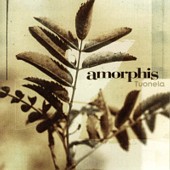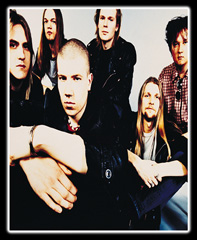


Amorphis' Tuonela - a word literally meaning "underworld" in the band's native tongue - dileneates from the metal norm, doing much musically and thematically to manipulate this monopoly of mental imagery that the heavy metal community has thrived upon and utilized since its inception. The Hell of Amorphis is more like a well worn path snaking through a heavily wooded yet still inviting terrain, one whose twists and turns draw the wandering visitor deeper into the imposing forest with promises of even greater beauty and mystique. In other words it is more expansive and less confined. And if Satan is around the bend out here, he is more than likely the sophisticated, handsome traveler who is more than happy to share a drink and conversation with you beneath a tall oak tree. Faust's Mephistopheles instead of a cheap horror movie special effects concoction.
This may not have always been the case, however. I must admit that Tuonela is my introduction to Amorphis, and surely there has been some evolution at work during the band's tenure. After all, it does reside on Relapse, a label with a penchant for music it dubs "Cameltoed Fuck Metal." "Cameltoed Fuck Metal" this is not. Actually, I am hard pressed to tout this as metal period, even in the current atmosphere of lax or crumbling or completely obliterated boundaries, which allows bands like Korn - who I don't dislike - and Limp Bizkit - who I do dislike - and anyone else of the "everything-but-the-kitchen- sink" ilk to be addressed as metal.
Yet I refuse to complain about the attribution of this tag to Amorphis as I would the other two aforementioned bands. For one, you should be elated to discover that not a smidgon of hip-hop stylings exists at any point throughout the ten songs that comprise Tuonela. That's right - no turntables, pseudo rapping or downtuned guitars. Another refreshing innovation is the unique blend of instruments the band does decide to incorporate into the mix. Seldom, if ever, has the sitar, saxophone, or even the flute been introduced to the heavy metal community, yet it does so in this case, and quite successfully, I might add. Their usage infuses the music with a richness and a level of class that musicians from most genres would be hard pressed to match.
The instrument that really pushes this release over the top, so to speak, creating the flow that propels this beautiful tapestry of music, is the voice of lead singer Pasi Koskinen. It has been some time, in fact, since I have heard a vocalist who is so integral to the band's conveyance of emotions. His singing, while perhaps not perfect in a theoretical sense, is so imbued with presentiment that the other instruments seem there quite often to compliment it, such as on the album's bookends, "The Way" and "Summer's End," and on the title track, in which the combination of voice and music comes to a crescendo during the chorus. In short, it's beautiful. Moving. The type of music that gives you goosebumps.
Metal or not, Tuonela is one of the premier releases of 1999. Yes, it is that good. If you don't want to sell your soul to the devil for Amorphis, I understand, although I don't see why anyone would desire not to get lost in the labyrinth of this hell.
